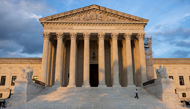▶ Charles M. Blow
This underscores the severe challenge facing the Sanders campaign: African-American voters have yet to fully connect to the man and the message.
An August Gallup Poll found that Hillary Clinton’s favorability among African-Americans was 80 percent, while Sanders’s was 23 percent. Two-thirds of blacks were unfamiliar with Sanders. This could pose a problem after the contests in overwhelmingly white Iowa and New Hampshire, where he has surged to tie or best Clinton, give way to contests in Southern states with much more sizable black populations.
South Carolina will be the first test. According to The New York Times, 55 percent of South Carolina Democratic primary voters were black in 2008. Yet current polls show Clinton with a massive lead over Sanders in the state. And those polls show Vice President Joe Biden leading Sanders, even though Biden has yet to announce whether he’ll run. That’s why it’s important not only for Sanders to spend more time in the state, but also to pick a venue like Benedict College.
But appearing at the college, a favorite speaking spot for Democratic primary candidates trying to boost their black vote in the state, is by no means a sure path to victory. Bill Bradley spoke there in 2000 when running against Al Gore. Gore crushed Bradley with 92 percent of the caucus vote. Carol Moseley Braun announced her candidacy there in 2003 but had to withdraw before the primary in the state. Al Sharpton and Wesley Clark spoke at the school in 2004, and both lost the state. In 2008, Clinton visited the school the day before the primary. She only won one county in the state.
Sanders is hoping for better.
There is an earnest, if snappy, aura to Sanders that is laudable and refreshing. One doesn’t sense the stench of ambition or the revolting unctuousness of incessant calculation. There is an idealistic crusader in the man, possibly to the point of being quixotic, but at least it doesn’t come off as corrupted by money or power or the God complex that so often attends those in pursuit of the seat behind the Resolute Desk.
Sanders’s message of revolutionary change to save a flailing middle class and challenge the sprawling influence of what he calls “the billionaire class” has struck a nerve with a fervid following.
I spoke with Senator Sanders by phone about his campaign’s need to reach more African-American voters, and I asked if he was worried about this need to broaden his appeal. While he resisted the word “worried,” he did acknowledge that: “Clearly, if we are going to do well nationally, it’s absolutely imperative that we aggressively reach out and bring the African-American community and the Latino community into our campaign, and that is exactly what we’re working on right now.”Sanders seemed to understand the challenge ahead of him. He has to win the African-Americans who supported Obama and do so against Clinton’s enormous name identification and the deep connections the Clinton machine has built in the state. And then there’s Biden.
But Sanders’s ability to win Obama’s supporters may have been made difficult by his associations. On Saturday, Sanders campaigned with Dr. Cornel West, who recently issued an endorsement of Sanders.
West’s critique of the president has been so blistering and unyielding . he has called Obama “counterfeit,” the “black face of the American empire,” a verb-ed neologism of the n-word . that it has bordered on petulance and self-parody.
Sanders must bank on his strongest suit: policies. In June, his campaign issued a press release, “Sanders’ Agenda for America Helps Minorities,” that touted his civil rights record as well as included economic remedies like raising the minimum wage and providing tuition-free college.
Part of his problem is that he hasn’t been able to properly promote his message of helping minorities. I asked him if he believes that the coverage he has gotten has been fair and equitable. Rather than complaining about the quantity of coverage, he complained about the quality, what he called “the soap opera aspect of politics.”
He explained: “So if I go up on a stage and I slip on a banana peel, do you think that will make the front page of the paper? Will it be on CNN? Probably will. Meanwhile, I have talked in 20 different speeches that 51 percent of young African-American kids are unemployed and underemployed. Do you know how much coverage that’s gotten? How much?” He answered his own question: “Every single speech that I give I talk about that. I don’t know that it’s made the newspapers yet.”
Well actually, The Wall Street Journal and The Washington Post have published articles that included essentially that statistic from Sanders. In addition, NPR, ABC News, Newsweek, the Huffington Post, The Week, National Review, RealClearPolitics, Salon, Vox and Alternet have published similar articles as well. But, I guess I get his point: He needs more . more quality and quantity to reach this essential audience.
스마터리빙
more [ 건강]
[ 건강]이제 혈관 건강도 챙기자!
[현대해운]우리 눈에 보이지 않기 때문에 혈관 건강을 챙기는 것은 결코 쉽지 않은데요. 여러분은 혈관 건강을 유지하기 위해 어떤 노력을 하시나요?
 [ 건강]
[ 건강]내 몸이 건강해지는 과일궁합
 [ 라이프]
[ 라이프]벌레야 물럿거라! 천연 해충제 만들기
 [ 건강]
[ 건강]혈압 낮추는데 좋은 식품
[현대해운]혈관 건강은 주로 노화가 진행되면서 지켜야 할 문제라고 인식되어 왔습니다. 최근 생활 패턴과 식생활의 변화로 혈관의 노화 진행이 빨라지고
사람·사람들
more
타운에 첫 한인 운영 수학·과학 정규학교
LA 한인타운에 수학·과학에 특화된 정규 사립중학교 ‘윈저 아카데미’(WMSA, 4055 Wilshire Blvd. #400, LA)가 지난 …

서각협회 ‘서각 교류전’ 11월1일 리앤리 갤러리
한국목우서각협회(회장 정기호)와 미주한인서각협회(회장 이애령)가 11월 1~8일 LA 한인타운 리앤리 갤러리에서 서각교류전을 갖는다.가주 의회…
KAF 자선 골프대회서 15만달러 기금 조성
남가주 한인사회 유일의 커뮤니티 재단인 KAF(Korean American Foundation) 주최 제2회 자선 골프대회가 지난 29일 어바…
피코 유니언 주민의회 공석중인 대의원 모집
LA 한인타운 일부를 포함하는 피코유니언 주민의회(의장 박상준)가 공석 중인 일부 대의원 자리를 새로 충원한다. 이번 대의원 모집은 65세 이…
“온라인으로 국립대 학위 취득하세요”
한국 국립방송통신대학교(Korea National Open University·이하 방통대)가 해외 학생 모집을 위한 본격적인 홍보 활동에 나…
많이 본 기사
- [경주 APEC] 구슬땀 흘리는 ‘숨은 주역들’
- 내일 ‘서머타임’ 해제
- 젠슨 황 “GPU 26만개 공급” 한국과 AI동맹
- 시진핑 APEC 입장 오늘 한중 정상회담
- 이 “신라 화백 정신으로” 글로벌 다자주의 협력 강조
- 트럼프, ‘저소득층 지속 지원’ 판결… 2
- 맘다니, 쿠오모에 10~25%P 차 우세
- ‘초강수’ 다저스, 토론토와 WS 6차전 3-1 승리…최종전 간다
- APEC ‘경주선언’ 채택… ‘문화창조산업’ 협력 필요성 첫 명문화
- 트럼프, ‘면허 박탈’ 위협하던 CBS와 인터뷰…거액 합의금 대가?
- 김선영, ‘투병’ 故백성문 떠나보낸 심경 “남편 사력 다해 버텼다”
- [경주 APEC] 온라인 화제 된 ‘깐부회동’ 말말말
- 김성훈 증언 때마다 쳐다본 윤… 특검 ‘김건희’ 호칭에 “여사 붙여라”
- 中, 미중 합의에 넥스페리아 수출금지 완화… “조건 부합시 허용”
- ‘트럼프 위협 불안’ 베네수엘라, 러·中·이란에 군사 지원 요청
- [경주APEC] 1박 2일 본회의 마무리…李대통령, 시진핑에 의장직 승계
- 국힘 “’결정권자’ 李대통령 재판 재개돼야”…연일 대장동 공세
- ‘성추문’ 英 앤드루 왕자, 왕자 칭호 뺏기고 관저서도 퇴거
- [경주 APEC] 정의선 “관세에 감사”… 이 대통령 “현대차 잘 돼야 한국이 잘 된다”
- 옥택연, 유부남 대열 합류 “오랜 연인과 내년 봄 결혼”
- 홍대 11만 모이고 이태원역 폐쇄…핼… 1
- 구글·아마존 이익 급증 뒤엔 앤스로픽…MS는 오픈AI 손실 반영
- 백악관, 기밀보호 이유로 ‘대변인 사무실’ 기자 출입금지
- ‘서머타임’ 해제로 대한항공 덜레스-인천 출도착시간 변경
- 시진핑 “내년 11월 中선전서 APEC회의…아태공동체 함께 만들자”
- 법원 “셧다운에도 비상자금으로 저소득… 1
- 밴스 부통령 “합법 이민규모 대폭 줄… 1
- 대법, 내주 트럼프 관세소송 심리… ‘對한국 15% 관세’ 운명은
- 소유, 델타항공에 사과 받았다.. “허위 루머 법적조치 할 것”
- ‘메시급’ 손흥민 위엄 “역사상 최고 이적료 썼는데... 그 이상의 성과” LAFC 수뇌부 극찬
- MD, 주정부 공무원 일자리 500여개 없애기로
- “트럼프를 왕처럼 대접”
- 연방상원,‘트럼프 상호관세 중단’결의안 통과
- [이지 사이언스] “AI 똑똑해질수록 더 이기적 행동 경향 보여”
- ‘사건반장’ 백성문 변호사 암투병 끝 별세..김선영 아나운서, 결혼 6년만 남편상
- 뉴저지주지사후보 지지율 격차 단 1% “투표함 열어봐야 안다”
- 특검 ‘김건희 일가 동업자’ 김충식 소환… 양평 공흥지구 특혜 의혹 추궁
- 트럼프, 韓 금관·훈장에 흡족했나… “우리나라 다시 존중받아”
- 스팬버거, 한인들에 한표 호소
- 사회보장국 “대면 셧다운 기간 서비스 축소”
- 문가비, 모자이크 없이 아들 첫 공개.. ‘친부’ 정우성♥일반인 결혼 소식 2개월만
- 뉴욕증시, 아마존·애플 호실적에 투심 개선…상승 마감
- S.E.S. 슈, 술 먹고 글 올렸나? “내 마음 같지 않아 허무”→삭제
- 북 “비핵화는 실현불가능 개꿈”…한중정상회담 의제협의에 반발
- 인기 예능 PD, 강제추행 혐의로 피소..혐의 부인 ‘이의 신청’
- 르세라핌, 엔비디아 행사서 특별무대…젠슨 황 CEO가 직접 소개
- 추경호, 조서 열람만 10시간 반 특검, 구속영장 청구 여부 고심
- 메타, 1GW 규모 태양광 전력 신규 구매…AI 전력수요 대응
- 美中정상, ‘넥스페리아 사태’도 합의…車업계 공급망 위기 해소
- 심상치 않은 김민재 이적설 “뮌헨, 이미 대체자 에이전트 만났다... 수비진 개편 돌입”
1/5지식톡

-
 테슬라 자동차 시트커버 장착
0
테슬라 자동차 시트커버 장착
0테슬라 시트커버, 사놓고 아직 못 씌우셨죠?장착이 생각보다 쉽지 않습니다.20년 경력 전문가에게 맡기세요 — 깔끔하고 딱 맞게 장착해드립니다!장착비용:앞좌석: $40뒷좌석: $60앞·뒷좌석 …
-
 식당용 부탄가스
0
식당용 부탄가스
0식당용 부탄가스 홀세일 합니다 로스앤젤레스 다운타운 픽업 가능 안녕 하세요?강아지 & 고양이 모든 애완동물 / 반려동물 식품 & 모든 애완동물/반려동물 관련 제품들 전문적으로 홀세일/취급하는 회사 입니다 100% …
-
 ACSL 국제 컴퓨터 과학 대회, …
0
ACSL 국제 컴퓨터 과학 대회, …
0웹사이트 : www.eduspot.co.kr 카카오톡 상담하기 : https://pf.kakao.com/_BEQWxb블로그 : https://blog.naver.com/eduspotmain안녕하세요, 에듀스팟입니다…
-
 바디프렌드 안마의자 창고 리퍼브 세…
0
바디프렌드 안마의자 창고 리퍼브 세…
0거의 새제품급 리퍼브 안마의자 대방출 한다고 합니다!8월 23일(토)…24일(일) 단 이틀!특가 판매가Famille: $500 ~ $1,000Falcon: $1,500 ~ $2,500픽업 & 배송직접 픽업 가능LA…
-
 바디프렌드 안마의자 창고 리퍼브 세…
0
바디프렌드 안마의자 창고 리퍼브 세…
0거의 새제품급 리퍼브 안마의자 대방출 한다고 합니다!8월 23일(토)…24일(일) 단 이틀!특가 판매가Famille: $500 ~ $1,000Falcon: $1,500 ~ $2,500픽업 & 배송직접 픽업 가능LA…
케이타운 1번가
오피니언

특별선거에서 소중한 한 표를

관세협상 타결, 한국의 전략적 승리
 조지 F· 윌 워싱턴포스트 칼럼니스트
조지 F· 윌 워싱턴포스트 칼럼니스트 [조지 F. 윌 칼럼] ICE가 미 시민권자이자 참전용사를 체포했을 때
 유경재 나성북부교회 담임목사
유경재 나성북부교회 담임목사 [한국춘추] AI와 선악과
 이희숙 시인·수필가
이희숙 시인·수필가 [금요단상] 흥부 듀오
 최호근 / 고려대 사학과 교수
최호근 / 고려대 사학과 교수 [역사 속 하루] 무솔리니, 파시즘 권력을 장악하다
 민병권 / 서울경제 논설위원
민병권 / 서울경제 논설위원[만화경] ‘모라벡의 역설’과 일자리 전환
 전 한인민주당협회 회장
전 한인민주당협회 회장 [스티브 강 ‘인사이드 미국’] 한인사회의 정치적 존재감을 묻다 - 주민발의안 50
 정영록 서울대 국제대학원 명예교수
정영록 서울대 국제대학원 명예교수 [백상논단] 미·중관계와 한국경제의 고차방정식
1/3지사별 뉴스

뉴저지주지사후보 지지율 격차 단 1% “투표함 열어봐야 안다”
11월4일 치러지는 뉴저지주지사 본선거가 막판까지 초박빙 접전을 보이면서 최종 승자를 예측하기 어려운 안갯속 판세가 펼쳐지고 있다.30일 발표…
연방상원,‘트럼프 상호관세 중단’결의안 통과

스팬버거, 한인들에 한표 호소
버지니아 주지사 선거가 닷새 앞으로 다가온 가운데 민주당 아비가일 스팬버거(Abigail Spanberger) 후보가 30일 애난데일을 찾았다…
사회보장국 “대면 셧다운 기간 서비스 축소”

[경주APEC] “트럼프 본회의 불참, 美리더십 타격…中영향력 확대 기회”
도널드 트럼프 대통령이 아시아태평양경제협력체(APEC) 정상회의 본회의에 불참하고 조기 귀국한 데 대해 미국 언론이 곱지 않은 시선을 보냈다.…
“총영사관 등 사칭 보이스피싱 주의 하세요”

오늘 하루 이 창 열지 않음 닫기 


















































.png)


댓글 안에 당신의 성숙함도 담아 주세요.
'오늘의 한마디'는 기사에 대하여 자신의 생각을 말하고 남의 생각을 들으며 서로 다양한 의견을 나누는 공간입니다. 그러나 간혹 불건전한 내용을 올리시는 분들이 계셔서 건전한 인터넷문화 정착을 위해 아래와 같은 운영원칙을 적용합니다.
자체 모니터링을 통해 아래에 해당하는 내용이 포함된 댓글이 발견되면 예고없이 삭제 조치를 하겠습니다.
불건전한 댓글을 올리거나, 이름에 비속어 및 상대방의 불쾌감을 주는 단어를 사용, 유명인 또는 특정 일반인을 사칭하는 경우 이용에 대한 차단 제재를 받을 수 있습니다. 차단될 경우, 일주일간 댓글을 달수 없게 됩니다.
명예훼손, 개인정보 유출, 욕설 등 법률에 위반되는 댓글은 관계 법령에 의거 민형사상 처벌을 받을 수 있으니 이용에 주의를 부탁드립니다.
Close
x